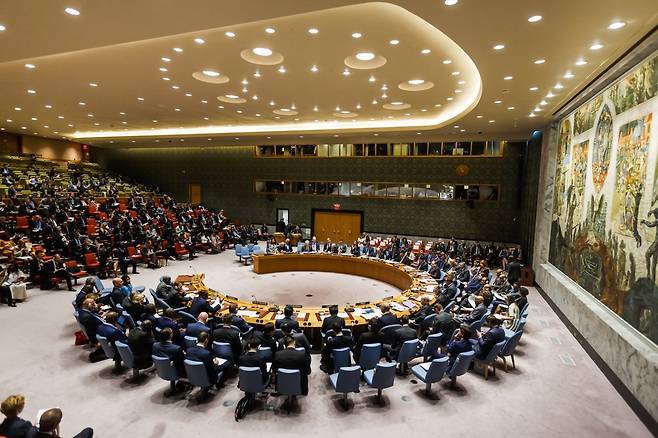UN to vote on US proposal for tougher sanctions on North Korea
이 글자크기로 변경됩니다.
(예시) 가장 빠른 뉴스가 있고 다양한 정보, 쌍방향 소통이 숨쉬는 다음뉴스를 만나보세요. 다음뉴스는 국내외 주요이슈와 실시간 속보, 문화생활 및 다양한 분야의 뉴스를 입체적으로 전달하고 있습니다.

The United Nations Security Council is set to vote on a US-proposed resolution on Thursday in the US, aimed at imposing additional sanctions on North Korea in response to the regime’s recent intercontinental ballistic missile launch.
According to diplomats cited by media reports in the United States, the US has scheduled the vote for the late afternoon. Washington holds the Security Council presidency for May.
The vote comes after Pyongyang test-fired three missiles on Wednesday, one of which is suspected to be an ICBM, toward waters off its east coast, as US President Joe Biden wrapped up his first trip in Asia, to Seoul and Tokyo.
The draft resolution for the additional sanction was first outlined by Washington in March, after Pyongyang test-fired its first ICBM in over four years
According to a US official quoted by Reuters, the draft resolution would “further restrict North Korea’s ability to advance its unlawful WMD (weapons of mass destruction) and ballistic missile programs, it would streamline sanctions implementation and further facilitate the delivery of humanitarian aid to those in need.”
While the passage of a resolution requires nine votes as well as no vetoes from the five permanent members of the UNSC, China and Russia have signaled their opposition to imposing additional sanctions on North Korea.
The five permanent members are the US, China, Russia, France and Britain, with each holding a power of veto that can prevent any resolution from being implemented, regardless of the extent of international support.
“We don’t think a resolution as proposed by the US can solve any problem,” a spokesperson for China’s UN mission was quoted as saying by Reuters. The spokesperson also explained how China had proposed the council to adopt a formal statement instead of a sanctions resolution.
The US-drafted resolution intends to toughen pressure against the reclusive regime, and focuses on curbing oil imports. The resolution aims to reduce the amount of oil Pyongyang can legally import annually from 4 million to 3 million barrels, or 525,000 tons to 393,750 tons, according to reports.
The import of refined petroleum for Pyongyang would also be reduced from 500,000 barrels to 375,000 barrels, if the resolution is passed. North Korean exports of clocks, watches and mineral fuels will also be banned under the envisioned sanctions.
Following Pyongyang’s launch of the three missiles Wednesday, the foreign ministers of South Korea and Japan and the US secretary of state exchanged calls to strongly condemn the test-firings.
In a call, South Korean Foreign Minister Park Jin and US Secretary of State Antony Blinken agreed that Pyongyang’s launch of the ballistic missiles was a “clear violation of multiple UN Security Council resolutions,” according to the ministry here
Along with Japanese Foreign Minister Yoshimasa Hayashi, the foreign affairs chiefs of the three countries affirmed their close trilateral cooperation to keep the North’s nuclear activities in check.
North Korea has been subject to UN sanctions since 2006. As the recalcitrant regime ratcheted up its nuclear ambitions, the UNSC also steadily strengthened sanctions with the aim of cutting off the funding for its nuclear programs.
By Jo He-rim (herim@heraldcorp.com)
By Jo He-rim(herim@heraldcorp.com)
Copyright © 코리아헤럴드. 무단전재 및 재배포 금지.